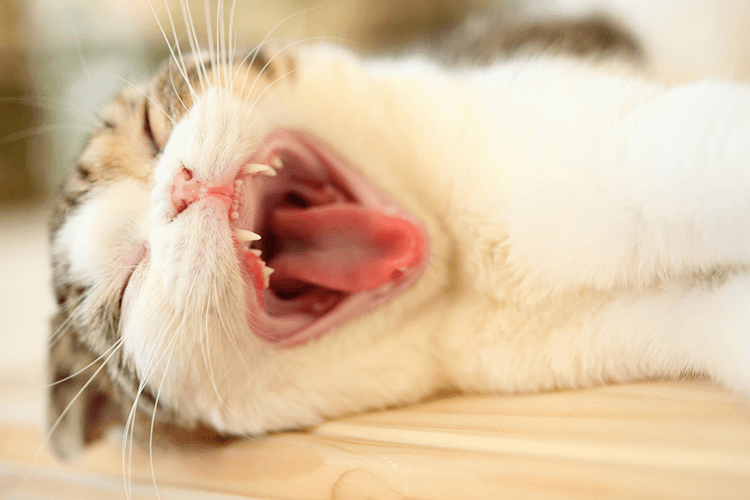You’ve felt them when she pounces and bites down on your ankle. You’ve seen them when she sleepily yawns in your face. And you’ve heard them as she devours her cat food each morning. Your kitten’s baby teeth, those tiny but sharp little gems that help your baby eat, play, and pretend that she’s a lion. But it’s not as simple as that. Read on to learn more about baby teeth and how to care for them.
Baby teeth in kittens go by many names; baby, primary, milk, or kitten teeth. These teeth are deciduous which means like a deciduous tree that loses its leaves in the fall, your kitten will lose this first set of teeth. All together there are 26 baby teeth that will make way for 30 adult or permanent teeth to come in. These are the teeth your kitty will have for the rest of his life.
The Ins and Outs of Kitten Baby Teeth
Your precious baby is born without teeth. Those teeny tiny kitten teeth first appear at around three weeks old with the final few coming in at around four months. This means that if you pick up your kitten at weaning, she will only have some, not all, of her baby teeth. The final molars come in well after she’s already won your heart.
Interestingly enough, your kitten will start losing baby teeth around the same time the last ones are coming in. So around four months of age, his tiny incisors, or the front teeth in between the long canines, will start being replaced by his adult incisors. Over the next two to three months, all of his baby teeth will be replaced by adult teeth plus a few more to reach that total of 30.
The Grind of Teething
With any luck you won’t even know that your kitten is teething. The normal process starts deep in the gums where your kitten’s adult teeth are lurking. When it’s time they will nudge the root of the baby tooth causing the root to dissolve. The cap, or visible part of the tooth, will then fall out and be replaced with just a little discomfort by the adult tooth. You may come across some of these discarded baby teeth especially if one should come out during play, but more often than not your kitten swallows them with no difficulties.
Other clues that your kitten is teething are drooling, difficulty or hesitation to eat, or excessive chewing. The last one might be hard to determine as kittens of this age are usually in a chewing mood anyway. You can help him through it by offering safe chew toys that are durable yet soft enough not to cause any harm. Just take a stroll down the cat toy isle at any pet store and you can have your pick of hundreds of chew toys just right for the occasion.
When Teething Goes Wrong
The teething process seems pretty straight forward and easy and for the majority of the time it is. However, sometimes some kitties choose to hold onto baby teeth while still getting adult teeth. I guess they prefer that shark mouth look of having double sets of teeth. Maybe they think it will make them be more ferocious or increase their ability to eat. The fact of the matter is it can become a problem. Baby teeth that aren’t lost when adult teeth come in, or retained baby teeth, can cause problems in your kitten’s bite, increase tarter buildup leading to gingivitis and tooth decay, or they can even cause sores on her lips and tongue. The most common retained baby teeth are the upper canines, followed by the lower canines and then the incisors. It’s pretty rare to have retained molars as those adult teeth are so huge they can push any babies out of the way.
Caring For Cat Teeth Young and Old
If you notice retained baby teeth in your kitten’s smile, see your veterinarian. I most often find retained baby teeth during pre-neuter or spay examinations. The best way to deal with retained baby teeth is extraction. Getting them out of the way of the adult tooth allows for proper tooth alignment and it gets rid of those unwanted nooks and crannies where tarter can form.
In order for your kitty to enjoy his teeth as long as possible, it’s not a bad idea to start a brushing routine. You can start this any time, the sooner the better. Talk with your veterinarian about the right products for you and your kitty. Regularly brushing your kitten’s teeth not only helps to keep them clean, but it also gives you a chance to survey what’s going on in that mouth. You’ll want to peek in there regularly during the teething process to make sure things are going smoothly and every tooth is where it needs to be.
A kitten’s baby teeth serve an important function. They are the ones that get to crunch that first kibble and bite the first finger. Staying in tune with your kitten’s baby teeth and their transition to adult teeth will ensure that your kitty’s mouth stays healthy for years to come.








My adult cat (whom I love but am increasingly angry at) has begun biting. When he does this, I grab him and put him outside. How do I get him to stop?
Hi Alisa, that’s so frustrating. I’m sorry to hear that. Sometimes positive reinforcement works best. When he bites just walk away from him. Don’t give him any attention at all. Then really pour on the affection when he’s good. Hopefully he’ll get the idea. Thanks!